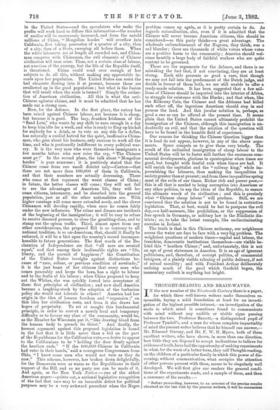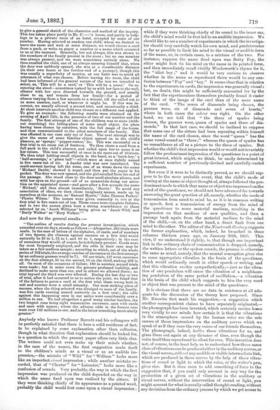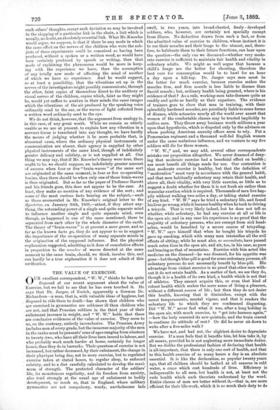THOUGHT-READING AND BRAIN - -WAVES.
IN the new number of the Nineteenth Century there is a paper, for which three well-known writers make themselves re- sponsible, laying a solid foundation at least for an investi- gation of the highest possible interest,—an investigation of the mode in which mind is sometimes found to communicate with mind without any audible or visible signs passing between the two. Professor Barrett,—a distinguished pupil of Professor Tyndall's, and a man for whose complete impartiality of mind the present writer believes that he himself can answer,— Mr. Edmund Gurney, and Mr. F. W. H. Myers, both of them excellent writers, who have shown, in more than one direction, how little they are disposed to accept inclinations to believe for evidence of truth, have had the opportunity of making experiments in what, for the want of a better term, they call Thought-reading, on the children of a particular family in which this power of dis- cerning, without communication, what occupies the attention of other persons present with them, seems to be singularly well developed. We will first give our readers the general condi- tions of the experiments made, and a sample of them, and then a summary of the results :— " Before proceeding, however, to an account of the precise results obtained on the last visit by the present writers, it will be convenient
to give a general sketch of the character and method of the inquiry. This has taken place partly in Mr. C—'s house, and partly in lodg- ings or in a private room of an hotel, occupied by some of our number. Having selected at random one child, whom we desired to leave the room and wait at some distance, we would choose a card from a pack, or write on paper a number or a name which occurred to us at the moment. Generally, but not always, this was shown to the members of the family present in the room ; but no one member
was always present, and we were sometimes entirely alone. We then recalled the child, one of us always assuring himself that, when the door was suddenly opened, she was at a considerable distance (in their own house at the further end of a passage), though this was usually a superfluity of caution, as our habit was to avoid all utterance of what was chosen. Before leaving the room, the child had been informed of the general nature of the test we intended to select, as, This will be a card,' or This will be a name.' On re- entering she stood—sometimes turned by us with her face to the wall, oftener with her eyes directed towards the ground, and usually close to us, and remote from her family—for a period of silence varying from a few seconds to a minute, till she called out to na some number, card, or whatever it might be. If this was in- correct, we usually allowed a second trial, and occasionally a third. At short intervals another child was chosen or a different test applied. To give an example : the following results were obtained on the evening of April 12th,-in the presence of two of our number and the family. The first attempt of one of the children was to state (with- out searching) the hiding-place of some small object, the place having been chosen by ourselves, with the full range of the house, and then communicated to the other members of the family. This was effected in one case only out of four. The next attempt was to give the name of some familiar object agreed on in the child's absence, as sponge," pepper-castor,' &c. This was successful on a first trial in six cases out of fourteen. We then chose a card from a fall pack in the child's absence, and called upon her to name it on her return. This was successful at once in six cases out of thirteen. We then tried holding small objects in the hand, as a 'latch-key,' a half-sovereign,' a green ball '—which were at once rightly named in five cases out of six. A harder trial was now introduced. The maid-servant having left the room, one of us wrote down the name Michael Davitt,' showed it round, and then put the paper in his pocket. The door was now opened, and the girl recalled from the end of the passage. She stood close to the door amid absolute silence, and with her eyes on the ground—all of us meanwhile fixing our atten- tion on the appointed name—and gave after a few seconds the name Michael,' and then almost immediately, Devitt.' To avoid any association of ideas, we then chose imaginary names, made up by ourselves at the moment, as Samuel Morris,' `John Thomas Parker,' `Flambe Wilson.' The names were given correctly in Coto at the first trial in five cases out of ten. Three cases were complete failures, and in two the names given bore a strong resemblance to those selected by us, Jacob Williams' being given as Jacob Wild,' and 'Emily Walker' as "Bury Walker."
And now for the general results :— " The outline of results during the present investigation, which extended over six days, stands as follows :—Altogether, 382 trials were made. In the case of letters of the alphabet, of cards, and of numbers of two figures, the chances against success on a first trial would naturally be 25 Co 1, 51 to 1, and 89 to 1, respectively; in the case of surnames they would, of coarse, be indefinitely greater. Cards were far most frequently employed, and the odds in their case may be taken as a fair medium sample ; according to which, out of the whole series of 382 trials, the average number of successes at the first attempt by an ordinary guesser would be 7/. Of our trials, 127 were successes on the first attempt, 56 an the second, 19 on the third, making 202 in all. On most of the occasions of failure, 180 in number, second trials were made ; but in some cases the guesser professed inability, and declined to make more than one, and in others we allowed three ; no trial beyond the third was ever allowed. During the last day or two of trial, after it had occurred to us to notice the point, we found that of the failures to guess a card at the first trial, those wrong both in suit and number were a small minority. Our most striking piece of success, when the thing selected was divulged to none of the family, was five cards running named correctly on a first trial ; the odds against this happening once in our series were considerably over a million to one. We bad altogether a good many similar batches, the two longest runs being eight consecutive successes, once with cards and once with names ; where the adverse odds in the former case were over 142 millions to one, and in the latter something incalculably greater."
Anybody who knows Professor Barrett and his colleagues will be perfectly satisfied that there is here a solid residuum of fact, to be explained by some explanation other than collusion, though in what direction that explanation should be looked for, is a question to which the present paper offers very little clue. The writers could not even make up their minds whether, in the case of the names, the first suggestion made itself to the children's minds as a visual or as an audible im- pression,—the mistake of " Wild" for " William" looks more like an imperfect visual impression ; while another mistake re- corded, that of " Chester " for " Leicester," looks more like a confusion of sounds. Very probably, the way in which the first impression was produced on the child depended on the way in which the name fixed upon was realised by the sitters. If they were thinking chiefly of its appearance as a printed word, probably the child would first come upon a visual impression ; while if they were thinking chiefly of its sound to the inner ear, the child's mind would be first led to an audible impression. We should like to see a number of experiments in which the investiga- tor should very carefully watch his own mind, and predetermine so far as possible to limit his mind to the visual or audible form of the name, or, in certain cases, to a mixture of the two. For instance, suppose the name fixed upon was Betty Foy, the sitter might first fix his mind on the name in its printed form, and then immediately recall vividly Wordsworth's rhyme for it, the " idiot boy ;" and it would be very curious to observe whether in the name as. reproduced there would be any con- fusion between "Foy" and "boy." It seems clear that in relation to the experiments on cards, the impression was generally visual ; but, no doubt, this might be sufficiently accounted for by the fact that the experimenters themselves probably found it easier to think of the image of the card than of the mere name of the card. " The seven of diamonds being chosen, the guesses were, six of diamonds and seven of hearts," where in both cases the colour was right. On the other hand, we are told that " the three of spades being chosen, the guesses were, queen of spades and three of dia- monds." In that last case, we should be inclined to suppose that some one of the sitters had been repeating within himself the name of the card chosen, since the word " queen " has the same vowel-sound as " three ;" whereas the queen of spades has no resemblance at all as a picture to the three of spades. But whether the child's first impression would or would not invariably follow the predominant impression of the questioner is a point of great interest, which might, we think, be easily determined by a sufficient number of previously-devised and carefully-varied experiments.
But even if it were to be distinctly proved, as we should sup- pose to be the more probable event, that the child's mode of coming at the name or object thought of, always followed the pre- dominant mode in which that name or object was im pressed on the mind of the questioner, we should not have advanced far towards answering the great question of all, namely, whether the mode of transmission from mind to mind be, as it is in common writing or speech, first a transmission of energy from the mind of the questioner to some material medium, resulting in the impression on that medium of new qualities, and then a passage back again from the material medium to the mind of the child,—or, on the other hand, a direct flash from one mind to the other. The editor of the Nineteenth Century suggests the former explanation, which, indeed, he broached in these columns thirteen years ago, on January 30th, 1869. This view, if we understand it rightly, is, that though one important link in the ordinary chain of communication is dropped, namely, the written letters or the spoken sounds, the process is otherwise the same as usual, namely, that the mental conception gives rise to some appropriate vibration in the brain of the questioner, which would ordinarily result in either speech or writing, and that this vibration excites sympathetically,—just as the vibra- tion of one pendulum will cause the vibration of a neighbour- ing pendulum of the same period of oscillation,—a vibration in the brain of the child which suggests to him the very word• or object that was present to the mind of the questioner.
It is obvious that there are no data in existence at all ade- quate for the discussion of the theory here proposed. Since Mr. Knowles first made his suggestion,—a suggestion which another correspondent claims to have separately originated,— the phonograph has been invented, which certainly carries home very vividly to our minds how certain it is that the vibrations in the atmosphere caused by the human voice are the sole causes of those impressions on the auditory nerves which we speak of as if they were the very voices of our friends themselves. The phonograph, indeed, bottles these vibrations for us, and gives them out again at any distance of time, even though the voice itself thus reproduced be silent for ever. This invention does not, of course, in the least help us to understand how those same class of vibrations can be produced either in the auditory nerves, or the visual nerves, without any audible or visible intermediate link, which are produced in those nerves by the help of those vibra- tions of sound or light to which the voice, or the writer's pen, gives rise. But it does seem to add something of force to the suggestion that, if you could only account in any way for the production of a given set of vibrations in the auditory or visual nerves, without the intervention of sound or light, you might account for what is usually called thought-reading, without any deviation from the ordinary process by which we get access to
each others' thoughts, except such deviation as may be involved in the skipping of a particular link in the chain, a link which is usually, no doubt, an absolutely essential link. What Mr. Knowles would argue, we suppose, is that if there be any mode in which the same effect on the nerves of the children who were the sub- jects of these experiments could be conceived as having been produced, without a spoken or a written word, as would have been certainly produced by speech or writing, then that mode of explaining the phenomena would be more in keep- ing with the experience we have, than the assumption of any totally new mode of affecting the mind of another of which we have no experience. And he would suggest, as at least a possibility, that the vibrations set up in the nerves of the investigators might possibly communicate, through the ether, faint copies of themselves direct to the auditory or visual nerves of the children, copies which, faint as they might be, would yet suffice to awaken in their minds the same images which the vibrations of the air produced by the speaking voice ordinarily send to the ear, or the waves of light reflected from a written word ordinarily send to the eye.
We do not think, however, that the argument from analogy is, in this case, of any great worth. While we remain so utterly unable as we are at present, to explain how any vibration in a nervous tissue is translated into any thought, we have hardly the means of judging whether it be more probable that, in abnormal cases, where the ordinary physical instruments of communication are absent, their agency is supplied by other physical instruments of the same kind, though of indefinitely greater delicacy and subtlety, or is not supplied at all. One thing we may say, that if Mr. Knowles's theory were true, there ought to be, we should suppose, an indefinitely greater amount of success when four or five "brain-waves " of the same sort are originated at the same moment, in four or five co-operating brains, than there should be when only one of those brain-waves is thus originated. But so far as the paper of Professor Barrett and his friends goes, this does not appear to be the case. At least, they make no mention of any evidence of the sort ; and some of the most curious facts bearing on the subject,—such as those enumerated in Mr. Knowles's original letter to the -Spectator, on January 30th, 1869,—attest, if they attest any- thing, the astounding power of a single and quite separate mind to influence another single and quite separate mind, even though, as happened in one of the cases mentioned, these be separated from each other by the whole diameter of the earth. The theory of "brain-waves" is at present a mere guess, and so far as the known facts go, they do not appear to us to suggest the importance of the co-operation of many separate minds in the origination of the supposed influence. But the physical explanation suggested, admitting as it does of cumulative effects in proportion to the number of waves directed at the same moment to the same brain, should, we think, involve this, and can hardly be a true explanation if it does not admit of this verification.
















































 Previous page
Previous page